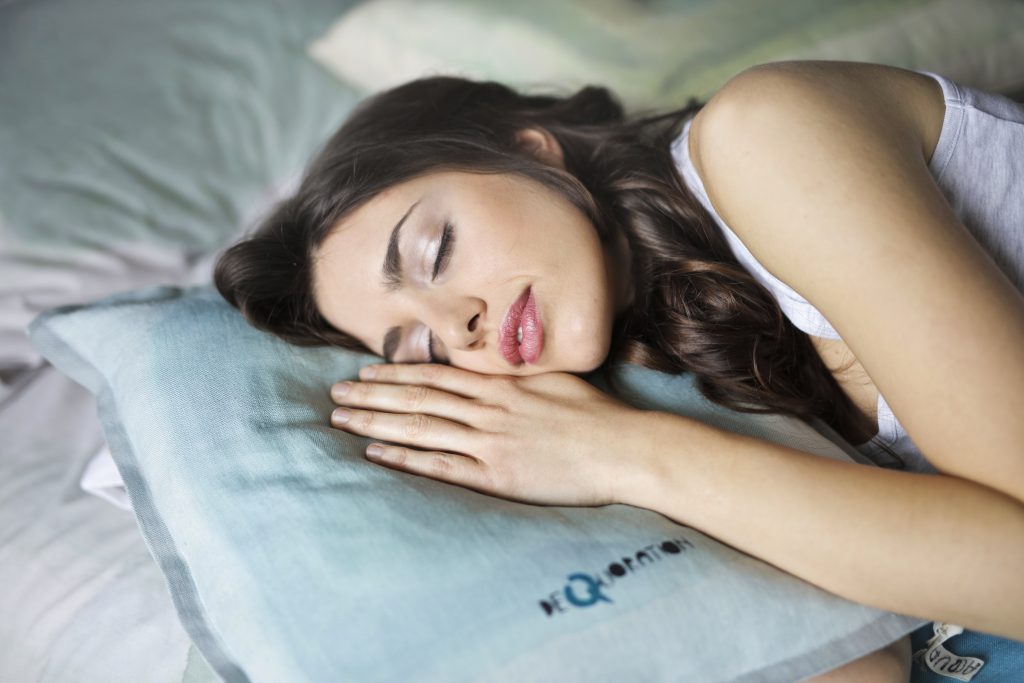
Sleep Health! We have all experienced the negative effects on our health when we do not have adequate sleep! Poor capacity to cope with stress, feelings of overwhelm, snappiness, moodiness, fatigue and and an inability to concentrate are all side-effects of poor sleep.
Sleep is in essential part of our health! A sound sleep helps our nervous system function, assists in recovery from injury and is an essential part of the bodies healing response.
We have five stages of sleep within a sleep cycle, with each cycle lasting approximately 90 minutes. We go through the sleep cycle 4to 6 times each night. This includes
- Light sleep- at the start of your cycle where your muscle activity decreases and the hormone melatonin (a messenger that is normally release as the sun sets and it becomes darker) initiates the process of falling asleep. This light sleep stage is where we are most likely to wake up or be disturbed.
- Real sleep- when we fall into unconsciousness and disconnect from a physical environment. Our body temperature starts to fall.
- Deep sleep- when we have total relaxation and our blood pressure drops we might be less responsive to external noise during this time
- Restorative sleep- when your heart and breathing rate is at its lowest. The body repairs itself here with hormones that promote cell growth and repair.
- REM sleep- it common to see the eyes dart back-and-forth in this stage, this is when we dream!
Disruptions to the natural sleep cycle can occur for a variety of reasons. These can include:
Breathing difficulties such a sleep apnoea. If you or your partner are experiencing heavy snoring it could be that your disruption to breathing is limiting your body’s capacity to follow a natural sleep cycle and descend into a deep sleep, leaving you constantly fatigued and prone to ‘nodding off’ during the day. If you have the symptoms need to talk to your GP and ensure that you seek advice.
Stress- Many people can have difficulty switching their brains! Stress can impact our capacity to fall asleep or stay asleep. Meditation techniques can help! Like to learn more about practical meditation techniques that can help you? Click here
Nocturia– Getting up frequently at night time to urinate can be a common problem that just disrupts our sleep cycle. Getting at 1 to 2 times each night could be considered normal. However if you are up more than this on a regular basis you need to seek help with women’s health physiotherapist to determine the cause! There can be straightforward solutions to this once individual assessment has been made to help this problem is resolved. Read more here about our women’s health team who can help you with this.
Quick Tips to Help You Sleep!
Have a regular bedtime and waking time. Your body’s natural circadian rhythms mean it is quite normal for a body to seek regular times to sleep and to rise. Staying up late and sleeping in on weekends does not make it any easier to rise early on a Monday for work. Try to ensure that you have a regular set bedtime (even setting a gentle alarm an hour before you should go to bed!) can be the reminder your need to start calming down and preparing for sleep.
Turn off screens an hour before bed– Watching TV or flicking through social media (and further delaying your set bedtime) can be detrimental to your sleep health. There is nothing on TV or social media that is more important than adequate sleep! Blue screens (computers laptops ipads iPhones) can also affect your body’s natural melatonin levels and alter your capacity to start the initial phase of falling asleep.
Exercise during the day– Is a great way to ensure good sleep health, however try to avoid exercising too late into the evening.
Keep your bedroom a sanctuary– If you get into the habit of working from your laptop in the bedroom, it can disrupt your sleep psychology that associates the bedroom with sleep. It is essential to leave your ‘brain noise’ associated with work or daily problems outside the bedroom! Keep your bedroom dark, cool and gadget free.
Adopt a routine- Calming the mind of stress and relaxing prior to sleep can help. Simple activities like reading, having a bath, listening to relaxing music before brushing your teeth and relaxing into bed can help clear the mind.
Limit coffee and alcohol- Coffee can take 8 hours to leave your system! Reduce caffeine intake toward the end of the day (this includes tea and chocolate- gasp!). Alcohol can also limit your deep sleep cycle and is best avoided. Nicotine is also a stimulant that is best avoided.
Ways to help you fall asleep-
Turn off devices, write down tomorrows to-do list and leave it in a different room, focus on the sound of your breathing, think of something calming like clouds drifting by or kites flying.
Ways to help with being ‘too awake’ to stay asleep
Do not berate yourself as this only increases a stress response, simply get out of bed if you can’t sleep. Do a repetitive task such as cleaning or colouring in until you become tired again, try some gentle yoga stretches, write down any thoughts that are keeping you awake and drink herbal tea. Turn the clock away from you to avoid ‘clock watching’ anxiety.
Many sleep problems can be resolved with simple habits and self-help measures, however if you have ongoing problems sleeping you should seek medical advice
 The Synergy Physio team love to help you with your health!
The Synergy Physio team love to help you with your health!
Contact our friendly reception team on 07 5448 3369 for questions, appointments or ask about our free phone consultation!
Contact us today on 07 5448 3369 or simply book online
References
- Sleep- Dr Arlene Unger
- Why We Sleep- The New Science of Sleep and Dreams- Matthew Walker

Leave A Comment